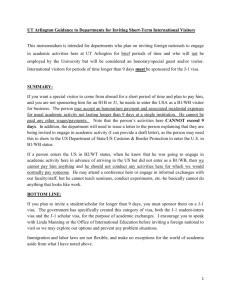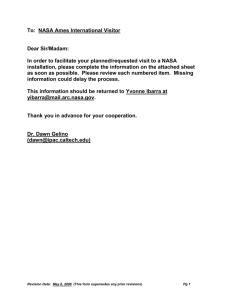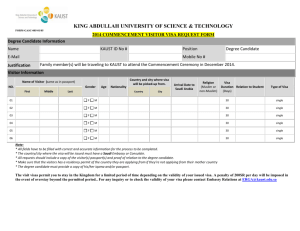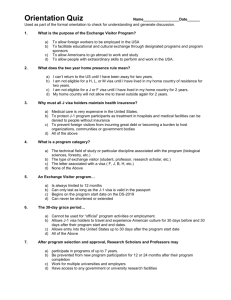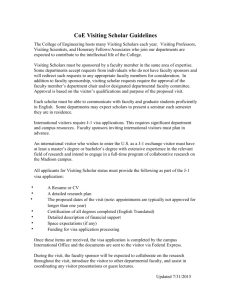Honoraria Under the American Competitiveness and Workforce
advertisement
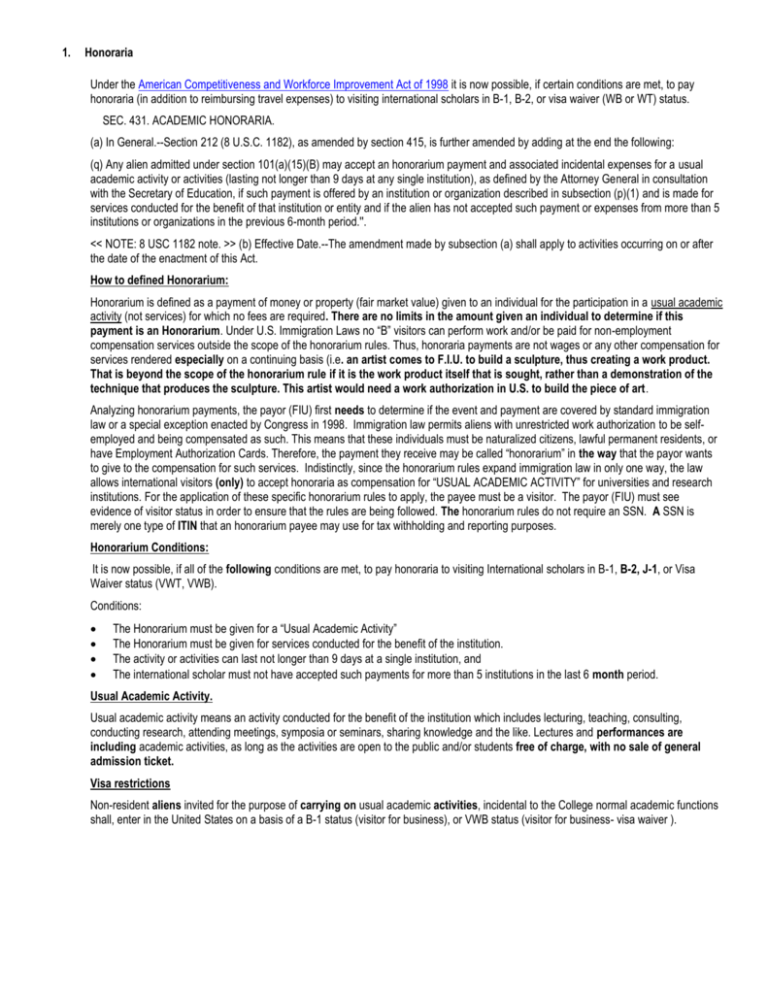
1. Honoraria Under the American Competitiveness and Workforce Improvement Act of 1998 it is now possible, if certain conditions are met, to pay honoraria (in addition to reimbursing travel expenses) to visiting international scholars in B-1, B-2, or visa waiver (WB or WT) status. SEC. 431. ACADEMIC HONORARIA. (a) In General.--Section 212 (8 U.S.C. 1182), as amended by section 415, is further amended by adding at the end the following: (q) Any alien admitted under section 101(a)(15)(B) may accept an honorarium payment and associated incidental expenses for a usual academic activity or activities (lasting not longer than 9 days at any single institution), as defined by the Attorney General in consultation with the Secretary of Education, if such payment is offered by an institution or organization described in subsection (p)(1) and is made for services conducted for the benefit of that institution or entity and if the alien has not accepted such payment or expenses from more than 5 institutions or organizations in the previous 6-month period.''. << NOTE: 8 USC 1182 note. >> (b) Effective Date.--The amendment made by subsection (a) shall apply to activities occurring on or after the date of the enactment of this Act. How to defined Honorarium: Honorarium is defined as a payment of money or property (fair market value) given to an individual for the participation in a usual academic activity (not services) for which no fees are required. There are no limits in the amount given an individual to determine if this payment is an Honorarium. Under U.S. Immigration Laws no “B” visitors can perform work and/or be paid for non-employment compensation services outside the scope of the honorarium rules. Thus, honoraria payments are not wages or any other compensation for services rendered especially on a continuing basis (i.e. an artist comes to F.I.U. to build a sculpture, thus creating a work product. That is beyond the scope of the honorarium rule if it is the work product itself that is sought, rather than a demonstration of the technique that produces the sculpture. This artist would need a work authorization in U.S. to build the piece of art. Analyzing honorarium payments, the payor (FIU) first needs to determine if the event and payment are covered by standard immigration law or a special exception enacted by Congress in 1998. Immigration law permits aliens with unrestricted work authorization to be selfemployed and being compensated as such. This means that these individuals must be naturalized citizens, lawful permanent residents, or have Employment Authorization Cards. Therefore, the payment they receive may be called “honorarium” in the way that the payor wants to give to the compensation for such services. Indistinctly, since the honorarium rules expand immigration law in only one way, the law allows international visitors (only) to accept honoraria as compensation for “USUAL ACADEMIC ACTIVITY” for universities and research institutions. For the application of these specific honorarium rules to apply, the payee must be a visitor. The payor (FIU) must see evidence of visitor status in order to ensure that the rules are being followed. The honorarium rules do not require an SSN. A SSN is merely one type of ITIN that an honorarium payee may use for tax withholding and reporting purposes. Honorarium Conditions: It is now possible, if all of the following conditions are met, to pay honoraria to visiting International scholars in B-1, B-2, J-1, or Visa Waiver status (VWT, VWB). Conditions: The Honorarium must be given for a “Usual Academic Activity” The Honorarium must be given for services conducted for the benefit of the institution. The activity or activities can last not longer than 9 days at a single institution, and The international scholar must not have accepted such payments for more than 5 institutions in the last 6 month period. Usual Academic Activity. Usual academic activity means an activity conducted for the benefit of the institution which includes lecturing, teaching, consulting, conducting research, attending meetings, symposia or seminars, sharing knowledge and the like. Lectures and performances are including academic activities, as long as the activities are open to the public and/or students free of charge, with no sale of general admission ticket. Visa restrictions Non-resident aliens invited for the purpose of carrying on usual academic activities, incidental to the College normal academic functions shall, enter in the United States on a basis of a B-1 status (visitor for business), or VWB status (visitor for business- visa waiver ). Not all non-resident aliens are eligible to receive honoraria, due to immigration restrictions. Please consult with the Office of International Students Services in advance of hosting a non-resident who is not in B-1, B-2, J-1(Student or Non-student Visa) or VWB status. Visa Type Description Honoraria Payment Travel Reimbursement B-1 or VWB Visitor for Business Yes Yes B-2 or VWT Visitor for Pleasure Yes No J-1 Exchange Visitor Yes Yes The following documents must be collected from the Honoraria recipient and submitted to the Controller’s Office / Tax Compliance Section prior to the time of service to authorize an Honoraria payment for a foreign national: 1. 2. 3. 4. 5. 6. 7. Honorarium Letter Foreign National Information Form Copy of I-94 (or I-94W if from a visa waiver country) and Visa. If J-1 visa, copy of Social Security Card and Copy of the DS-2019 or IAP-66. Exchange visitors (J-1 Visas) need previous authorization from the International Office of the Institution which sponsor their Visa (For students under J-1 such authorization from the student’s sponsor must specified that the work was to be done under Academic Training). Form 8233 and Statement (if Treaty prevails). If B-1, B-2, VWB or VWT, Social Security Card or ITIN card (if treaty benefits claimed). The following documents must be submitted to the Purchasing Department: 1. 2. I.R.S. Form W-8BEN Vendor Application Document/Visa B-1 or VWB B-2 or VWT J-1 Certification Statement Foreign National Information Form I-94 and Visa Social Security Card and DS-2019 or IAP-66 Employer Sponsor Authorization Form 8233 (If treaty) SS Card or ITIN W-8BEN Vendor Application The Following IRS Regulations shall be performed: All payments of honoraria to non-resident aliens who come to the University must be reported to the IRS on Form 1042-S. All honoraria payments to foreign nationals shall be taxed at a 30% rate, unless exempted by a tax treaty. In order to claim a tax treaty exemption from tax withholding, the non-resident alien must be from a country, which has a treaty with the United States that has a teacher/researcher provision and IRS Form 8233 and Statement must be completed. J-1’s must have a Social Security Number (SSN) or must apply for one at the local Social Security Office and they must have permission from the International Office of the Institution which sponsored their IAP-66 or DS-2019. If the visitor does not have an SSN or ITIN, prior to the request for payment, treaty benefits cannot be applied, and the payment shall be taxed at 30%.
